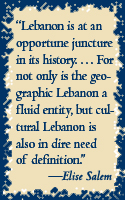

Literally Piecing Together
Lebanon
One might expect a literary scholar to spend an overseas sabbatical holed up in a university library, soaking in hundreds of texts not available in the U.S. Instead, Professor of English and Communications Elise Salem chose to spend her time literally in the streets, examining contemporary building sites as well as ancient ruins. “The main purpose of sabbatical,” she says, “is to engage in extensive research to further one’s scholarship, broaden one’s perspective … I am studying the physical reconstruction of the downtown area of Beirut, which was totally destroyed during the wars of 1975–1991.”
Formerly a vibrant cultural center in the Middle East, downtown Beirut was described by Salem as “nothing but stray cats and ruins” during the war years. After extensive urban design and architectural planning, reconstruction of the area is underway. “I studied the new spaces being created for use as cultural centers.”
Salem’s theory that culture can help to define, or in this case redefine, a nation is an outgrowth of her most recent project, a book on Lebanese literature and culture published in March. Titled Constructing Lebanon: A Century of Literary Narratives, the volume covers 100 years of written literature as well as dramatic performances. “This book does something new and useful by systematically analyzing those literary narratives in order to apprehend better their relationship to the political entity of Lebanon. I hope to illustrate that, in the Lebanese context, politics and literature are inseparable.”

“Not only does culture matter,” Salem says, “it especially matters now as Lebanon is at an opportune juncture in its history. … For not only is the geographic Lebanon a fluid entity, but cultural Lebanon is also in dire need of definition.” Issues to be considered included the definition of Lebanese citizenship, “the huge emigrant Lebanese population that now amounts to more Lebanese abroad than in Lebanon” and the representation of a balance of ethnic and “confessional” or religious groups.
Salem has found that in the process of this rebuilding, “a vital part of Lebanese history and culture” has literally been unearthed. Construction progress is repeatedly stopped for the study of ancient ruins discovered beneath the remains of buildings. “They are uncovering archeological sites that have to be studied and understood, and various groups are interested in what they are finding so it all has to be carefully considered before construction can proceed.”
Beyond the cultural aspects she was expecting to find, Salem’s studies have, as she says, “really opened my eyes to the process of nation building, establishing a nation-state.” She is a believer in “preserving buildings or sites devastated by the civil war as clear reminders of recent national history.” This may be particularly relevant to teaching about writers from areas where nation building is a fluid process. And, Salem’s newfound understanding of nation building and the importance of cultural history will help her to better teach Arab literature and culture to her American students.
A Cultural Exchange of Nobel Proportions
FDU Magazine Home | Table of Contents | FDU Home | Alumni Home | Comments